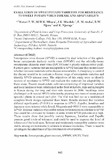| dc.contributor.author | Njoroge, K. | |
| dc.contributor.author | Njeru, R.W. | |
| dc.contributor.author | Ateka, E. M. | |
| dc.contributor.author | Mwololo, J.K. | |
| dc.contributor.author | Mburu, M.W.K | |
| dc.contributor.author | Muturi, P. W | |
| dc.date.accessioned | 2014-07-17T07:48:36Z | |
| dc.date.available | 2014-07-17T07:48:36Z | |
| dc.date.issued | 2011-09 | |
| dc.identifier.citation | Optimimization of Agricultural Value Chains for sustainable Development | en_US |
| dc.identifier.uri | http://hdl.handle.net/11295/73149 | |
| dc.description | Oral presentation at aGRO 2011 Biennial Conference | en_US |
| dc.description.abstract | Sweetpotato virus disease (SPVD) is caused by dual infection of the aphidborne
sweetpotato feathery mottle virus (SPFMV) and the whitefly-borne
sweetpotato chlorotic stunt virus (SPCSV) and it greatly reduces tuber yield.
Farmers grow varieties that are susceptible to SPVD because they do not know
whether resistant materials to the disease are available. A cheap way to control
the disease would be to evaluate a diverse range of sweetpotato varieties and
identify SPVD tolerant ones. The objectives of this study were to identify
sources of resistance to SPVD and evaluate the materials for adaptability in
these areas. Twenty sweet potato cultivars comprising of improved varieties
and locallandraces were established in the field at Kabete, Juja and Kibirigwi
in Kenya during the long and short rain seasons in 2006. Seedlings were
challenged with natural SPVD infection by planting two rows of sweet potato
spreader plants in around each plot. The trial was laid out as a randomised
complete block design replicated three times. Results showed that varieties
differed significantly (P<O.Ol) in response to SPVD. Zapallo, Jonathan and
Japonese were tolerant while Jewel, Mugande and 440015 were susceptible to
SPVD. Tolerant varieties were stable across environments in relation to SPVD
thus could be cultivated by farmers in areas where SPVD prevalence is high.
These results show that possibly variety Japonese, Jonathan and Zapallo
possess good levels of tolerance, and could be used to improve the level of
tolerance of the land races. Tolerant and moderately susceptible varieties were
stable among environments in relation to disease incidence. There is need to
investigate the inheritance of this resistance in sweet potato. | en_US |
| dc.description.sponsorship | National Council of Science and Technology, The Kenya Seed Company | en_US |
| dc.language.iso | en | en_US |
| dc.publisher | Faculty of Agriculture, University of Nairobi | en_US |
| dc.subject | Yield | en_US |
| dc.subject | SPCSV, | en_US |
| dc.subject | SPFMV, | en_US |
| dc.subject | plant resistant, | en_US |
| dc.subject | Sweet potato, | en_US |
| dc.title | Evaluation of sweetpotato varieties for resistance to sweet potato virus disease and adaptability | en_US |
| dc.type | Presentation | en_US |
| dc.type.material | en | en_US |

